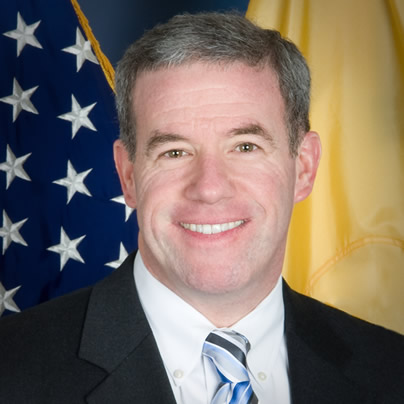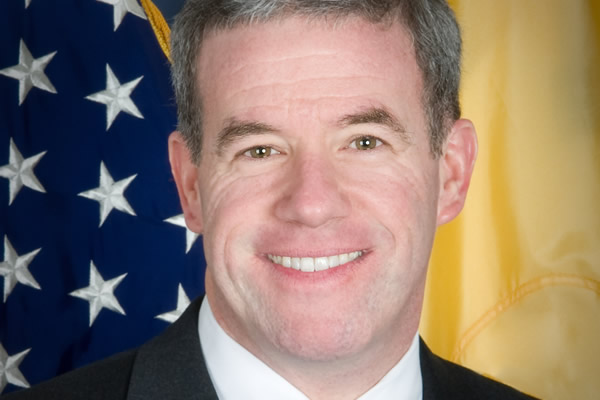Politics
Where does New Jersey’s interim senator stand on LGBT issues?
Chiesa appointed as votes may come up on ENDA, UAFA

Eyes will be on Gov. Chris Christie’s choice for interim U.S. senator in New Jersey if bills sought by LGBT advocates come up for a vote on the floor while he occupies the seat.
On Thursday, Christie announced that he’s designating New Jersey Attorney General Jeffrey Chiesa to occupy the seat on an interim basis after the death of Sen. Frank Lautenberg. Chiesa will hold the seat until New Jersey voters decide on a permanent U.S. senator in a special election set for Oct. 16.
It’s unclear where Chiesa stands on federal LGBT issues. Christie’s office didn’t immediately respond to a request from the Washington Blade to comment on Chiesa’s views
But during a Jan. 25, 2012 interview with NJ Today, Chiesa spoke out on the issue of defending state law against pending litigation seeking marriage equality in New Jersey. Articulating a somewhat neutral position, Chiesa said he’ll defend the law banning same-sex marriage, or defend the law if it were changed.
“My role as the legal adviser is to defend the constitution and the laws as they’re passed,” Chiesa said. “We’ll continue to do that. The laws as they’re in place right now to the extend that they’re being contested as being unconstitutional, my office will continue to assert their constitutionality, and if there’s other laws that are passed, it’ll be our job to do the same thing whatever the state of the law is.”
Litigation pending before the state court in New Jersey seeking marriage equality, known as Garden State Equality v. Dow, was filed by Lambda Legal and the statewide LGBT advocacy group Garden State Equality. State officials in other states — such as California Attorney General Kamala Harris and Illinois Attorney General Lisa Madigan — have refused to defend bans on same-sex marriage against similar lawsuits.
Also on the issue of marriage, Chiesa never changed an existing opinion from previous New Jersey Attorney General Paula Dow saying out-of-state same-sex marriages won’t be recognized in the Garden State.
TJ Helmstetter, a spokesperson for Garden State Equality, said Chiesa was “a surprise pick” and hopes the new interim senator will take the opportunity to learn more about them during his role as U.S. senator.
“We hope that during his time in Washington, however that short that is, that he uses that time like so many other members of both parties to evolve on issues of equality and to really get with the rest of New Jersey, the majority of New Jerseyans, who support fairness for all families,” Helmstetter said.
But there’s some evidence of support. Helmstetter praised Chiesa for work in implementing and defending the LGBT-inclusive anti-bullying legislation that Christie signed into law.
“We must give credit where credit is due, and this AG has been helpful, for instance, in defending the anti-bullying ‘Bill of Rights,’ working with our organization to make sure that New Jersey has the strongest anti-bullying bill, not only in law but also in fact,” Helmstetter said.
Chiesa’s views on LGBT issues will be important as LGBT advocates seek to overcome the 60-vote threshold to beat a filibuster on bills that may come to the floor in the coming months, such as the Employment Non-Discrimination Act and the Uniting American Families Act. Education reform legislation that includes the Student Non-Discrimination Act and the Safe Schools Improvement Act — which a Senate committee will start considering on Tuesday — may also come to the floor.
A “no” vote from the Republican would be particularly poignant because Chiesa is occupying a seat held by Lautenberg, whom LGBT advocates praised as a “champion for equality” upon his death his earlier this week.
Chiesa’s views may conform to those views of Christie, who opposes same-sex marriage and vetoed a bill that would have legalized it in the state, but also signed into law one of the strongest LGBT-inclusive anti-bullying bills in the country.
But Helmstetter said it’s possible that state laws in New Jersey against LGBT employment non-discrimination and anti-LGBT bullying would prompt him to vote in favor of similar measures on a federal level.
“I would that expect Chiesa — coming from a state that is so overwhelmingly pro-equality and already has protections in place around employment and so many other areas — that he would take that knowledge from a pro-equality state to Washington and help spread that equality on a federal level,” Helmstetter said.
Congress
Congress passes ‘Big, Beautiful Bill’ with massive cuts to health insurance coverage
Roughly 1.8 million LGBTQ Americans rely on Medicaid

The “Big, Beautiful Bill” heads to President Donald Trump’s desk following the vote by the Republican majority in the U.S. House of Representatives Thursday, which saw two nays from GOP members and unified opposition from the entire Democratic caucus.
To partially offset the cost of tax breaks that disproportionately favor the wealthy, the bill contains massive cuts to Medicaid and social safety net programs like food assistance for the poor while adding a projected $3.3 billion to the deficit.
Policy wise, the signature legislation of Trump’s second term rolls back clean energy tax credits passed under the Biden-Harris administration while beefing up funding for defense and border security.
Roughly 13 percent of LGBTQ adults in the U.S., about 1.8 million people, rely on Medicaid as their primary health insurer, compared to seven percent of non-LGBTQ adults, according to the UCLA School of Law’s Williams Institute think tank on sexual orientation and gender identities.
In total, the Congressional Budget Office estimates the cuts will cause more than 10 million Americans to lose their coverage under Medicaid and anywhere from three to five million to lose their care under Affordable Care Act marketplace plans.
A number of Republicans in the House and Senate opposed the bill reasoning that they might face political consequences for taking away access to healthcare for, particularly, low-income Americans who rely on Medicaid. Poorer voters flocked to Trump in last year’s presidential election, exit polls show.
A provision that would have blocked the use of federal funds to reimburse medical care for transgender youth was blocked by the Senate Parliamentarian and ultimately struck from the legislation — reportedly after the first trans member of Congress, U.S. Rep. Sarah McBride (D-Del.) and the first lesbian U.S. senator, Tammy Baldwin (D-Wis.), shored up unified opposition to the proposal among Congressional Democrats.
Congress
Ritchie Torres says he is unlikely to run for NY governor
One poll showed gay Democratic congressman nearly tied with Kathy Hochul

Gay Democratic Congressman Ritchie Torres of New York is unlikely to challenge New York Gov. Kathy Hochul (D) in the state’s next gubernatorial race, he said during an appearance Wednesday on MSNBC’s “Morning Joe.”
“I’m unlikely to run for governor,” he said. ““I feel like the assault that we’ve seen on the social safety net in the Bronx is so unprecedented. It’s so overwhelming that I’m going to keep my focus on Washington, D.C.”
Torres and Hochul were nearly tied in a poll this spring of likely Democratic voters in New York City, fueling speculation that the congressman might run. A Siena College poll, however, found Hochul leading with a wider margin.
Back in D.C., the congressman and his colleagues are unified in their opposition to President Donald Trump’s signature legislation, the “Big Beautiful Bill,” which heads back to the House after passing the Senate by one vote this week.
To pay for tax cuts that disproportionately advantage the ultra-wealthy and large corporations, the president and Congressional Republicans have proposed massive cuts to Medicaid and other social programs.
A provision in the Senate version of the bill that would have blocked the use of federal funds to reimburse medical care for transgender youth was blocked by the Senate Parliamentarian and ultimately struck from the legislation, reportedly after pressure from transgender U.S. Rep. Sarah McBride (D-Del.) and lesbian U.S. Sen. Tammy Baldwin (D-Wis.).
Torres on “Morning Joe” said, “The so-called Big Beautiful Bill represents a betrayal of the working people of America and nowhere more so than in the Bronx,” adding, “It’s going to destabilize every health care provider, every hospital.”
Congress
House Democrats oppose Bessent’s removal of SOGI from discrimination complaint forms
Congressional Equality Caucus sharply criticized move

A letter issued last week by a group of House Democrats objects to Treasury Secretary Scott Bessent’s removal of sexual orientation and gender identity as bases for sex discrimination complaints in several Equal Employment Opportunity forms.
Bessent, who is gay, is the highest ranking openly LGBTQ official in American history and the second out Cabinet member next to Pete Buttigieg, who served as transportation secretary during the Biden-Harris administration.
The signatories to the letter include a few out members of Congress, Congressional Equality Caucus chair and co-chairs Mark Takano (Calif.), Ritchie Torres (N.Y.), and Becca Balint (Vt.), along with U.S. Reps. Nikema Williams (Ga.), Hank Johnson (Ga.), Raja Krishnamoorthi (Ill.), Delia Ramirez (Ill.), Joyce Beatty (Ohio), Lloyd Doggett (Texas), Eleanor Holmes Norton (D.C.), Josh Gottheimer (N.J.), and Sylvia Garcia (D-Texas).
The letter explains the “critical role” played by the EEO given the strictures and limits on how federal employees can find recourse for unlawful workplace discrimination — namely, without the ability to file complaints directly with the Employment Opportunity Commission or otherwise engage with the agency unless the complainant “appeal[s] an agency’s decision following the agency’s investigation or request[s] a hearing before an administrative judge.”
“Your attempt to remove ‘gender identity’ and ‘sexual orientation’ as bases for sex discrimination complaints in numerous Equal Employment Opportunity (EEO) forms will create unnecessary hurdles to employees filing EEO complaints and undermine enforcement of federal employee’s nondiscrimination protections,” the members wrote in their letter.
They further explain the legal basis behind LGBTQ inclusive nondiscrimination protections for federal employees in the EEOC’s decisions in Macy v. Holder (2012) and Baldwin v. Foxx (2015) and the U.S. Supreme Court’s decision in Bostock v. Clayton County (2020).
“It appears that these changes may be an attempt by the department to dissuade employees from reporting gender identity and sexual orientation discrimination,” the lawmakers wrote. “Without forms clearly enumerating gender identity and sexual orientation as forms of sex discrimination, the average employee who experiences these forms of discrimination may see these forms and not realize that the discrimination they experienced was unlawful and something that they can report and seek recourse for.”
“A more alarming view would be that the department no longer plans to fulfill its legal obligations to investigate complaints of gender identity and sexual orientation and ensure its
employees are working in an environment free from these forms of discrimination,” they added.
-

 Sports5 days ago
Sports5 days agoTrans cyclist’s victory sparks outrage in conservative media
-

 Congress5 days ago
Congress5 days agoCongress passes ‘Big, Beautiful Bill’ with massive cuts to health insurance coverage
-

 Israel5 days ago
Israel5 days agoActivist recalls experience in Tel Aviv after Israel-Iran war began
-

 Celebrity News5 days ago
Celebrity News5 days agoNina West’s ‘Sugar in the Tank’ tour comes to Rehoboth Beach













